Plumbing Protection
Some of these smart devices are more than a leak alarm—they can help you understand your water usage and diagnose plumbing problems.
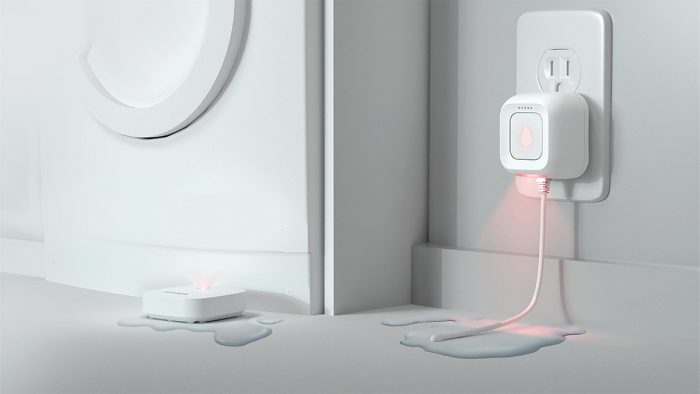
Catching a plumbing leak quickly can prevent a host of headaches — repairing or replacing damaged walls or ceilings, removing mold and rotted lumber, and making an insurance claim. As a form of “cheap insurance,” a number of companies now offer residential water-leak detectors that can alert you as soon as a leak occurs.
These detectors vary from inexpensive devices that sound an audible alarm to systems that cost hundreds of dollars, connect to Wi-Fi (and so are able to alert you through a smartphone app even when you’re not home), and automatically shut off the water supply. This article profiles several of these options and also includes a sidebar that features plumber Mike Lombardi installing the Moen Flo system in an old house with copper pipes.
Water Leaks Can Cost You
When it comes to the most common sources of homeowners insurance claims, wind, hail, lightning, fire, and water damage always make the list. When it comes to water damage, the range of likely claims may include plumbing and appliance leaks, roof leaks, and rain and snowstorm damage.
As the type and severity of the damage varies, so do the chances that the damage is covered. Policies often don’t cover water damage that starts on or in the ground around the house, like flooding, backed-up footing drains, a malfunctioning sump pump, or a leaky foundation. They do often cover plumbing leaks. Of course, the only way to know for sure what’s covered is to read your policy carefully.
At well over $10,000, the average value of water-damage claims is not insignificant. When it comes to plumbing leaks, those that are caught quickly may not cause enough damage to warrant an insurance claim, while those that go undetected can result in severe damage, including rot and mold.
Moreover, water leaks don’t have to be damaging to be costly. If you pay for water or live in an area where water conservation is important, undetected leaks can be wasteful. So if you could minimize the damage and cost of a plumbing leak by finding it as soon as it starts, would that be worth $100? How much would you be willing to spend on a device that automatically shuts off the water supply when a leak is detected?
In the designing and building of a house, there are many opportunities for adding “cheap insurance.” Waterproofing plus a dimple mat on the foundation (in case you finish the basement someday), air-sealing tape and expanding spray foam around windows (the old “belt and suspenders” approach), a heat pump and backup electric baseboard heaters (just for the coldest days of the year), and an extra course of ice-and-water membrane on the roof (because it’s only a 6-pitch)—if you include it all, that “cheap insurance” is now one expensive line item in the budget.
Maybe this is why we’re not installing water-leak detectors in every house. Take a closer look at these products, however, and you’ll find much more than an alarm that sounds when your water heater finally fails (though some are that simple). You’ll find a category of smart and useful tools to help you understand your water usage and diagnose problems with your plumbing system. And you’ll find an emerging category of plumbing products worth considering.
Basic Leak Detectors Are Alarming
If you decide that a water-leak detector offers a level of protection you’d like to have in your house, you’ll have to answer a number of questions to determine the product that is right for you. Do you want to know if you have a leak no matter where you are, via an app on your phone? Or are you willing to forgo remote alerts and simply have an alarm that sounds in your home?
Is it enough to be alerted about a leak, or do you want the equipment to be able to shut off the water supply when one is detected? Is leak detection enough, or would you like to know about temperature and humidity levels in your house that may be the cause or the result of a leak? Are you interested in information about your daily, monthly, and annual water usage? And, of course, how much do you want to spend?
Like smart thermostats, water-leak detectors are available from the companies you would expect to offer them and from companies you’ve never heard of. For example, plumbing giant Moen makes a popular suite of leak-detection products called Flo, while the Flume Smart Home Water Monitor is offered by a computer and electronics startup with no history in the plumbing industry. Flo and Flume are legitimate “smart” devices. They learn, or collect data, and employ artificial intelligence (AI). But not all water-leak detectors are smart, nor are they all expensive.
For about $11 on Amazon, you can order a battery-powered Resideo water-leak detector with an onboard alarm. It doesn’t need Wi-Fi and won’t connect to your smart-home hub, but if you place one at the base of your water heater, one beneath each of your sinks, one under your dishwasher, and one in your laundry room, and if you’re home when it sounds, it’s a low price to pay for damage control.
If you want to know that your water heater has sprung a leak while you’re out to dinner but don’t need any bells and whistles, you can get a basic Wi-Fi-connected leak detector from D-Link for about $90. The D-Link water-leak detector has a central plug-in unit—requiring a strategically placed AC outlet—with a moisture-sensing extension cord that can be placed to detect leaks.
Battery-powered and wireless sensors can be positioned in remote locations around the house and will communicate with the hub. If a leak is detected, an alarm will sound in the house and notifications will be sent to your phone. D-Link offers an app to use with its products and integrates with some common smart-home systems.
The jump to a smart, or learning, device starts at about $250. The company Flume, based in San Luis Obispo, Calif., launched with water conservation in mind. The Flume Smart Home Water Monitor has three components: a battery-powered sensor installed at your water meter, a plug-in “bridge” located in the house where it can be connected to your Wi-Fi network, and a smartphone app.
The company claims it takes just 10 minutes to get the system up and running. Once the software collects enough data to learn your habits, the app provides a detailed breakdown of your water usage and offers suggestions for curbing consumption. And, of course, it offers immediate alerts if a leak is detected. Though Flume has no annual fee for customers who buy the product direct, some insurance programs that offer the product at a discount may require an annual subscription. If you have a well and no water meter, the Flume product is not a good fit.
With all three of these products, you’ll need to know where your water shutoff valve is located and be available to shut off the water supply in the event of a leak.
Automatic Shutoff, at a Cost
Products like the Resideo detector and the Flume monitor don’t require a professional—or even plumbing skills—to install. They also represent the affordable end of what’s available for water-leak detection. The jump in cost and installation complexity comes with products that automatically shut off the water supply when a problem is detected.
Moen’s Flo Smart Water Monitor and Shutoff is another smart device. Like the Flume monitor, Flo collects data to learn about your plumbing system and your habits, which then allows it to alert you to irregularities. Flo is a suite of products that includes remote sensors that can be placed around the house, similar to the offerings from D-Link. But Flo provides something that the products mentioned so far do not—an in-line motorized shutoff valve installed in the home’s main water supply. Moisture detection, or troublesome irregularities in water usage, trigger alerts in the Flo app, from which you can shut off the water supply. And you can also set up the app to close the valve automatically in these situations.
Moen offers the Flo shutoff for three different pipe sizes. On the company’s website, prices for the Flo in-line valve range from about $500 for 3/4-in. pipe to about $800 for 1-1/4-in. pipe. Online prices seem to vary widely, so shop around if you’re interested in the Flo products.
Flo’s remote sensors monitor for moisture, temperature, and humidity to be immediately aware of concerning conditions. And Moen offers a few more handy accessories under the Flo umbrella, including extension cables for the remote sensors and a sump-pump monitor that can be added to an existing sump to check water level, as well as to provide leak detection and alert you of loss of power to the sump pump.
Another company that comes at leak detection from the tech sector and water conservation angle is Phyn. With a somewhat cooler look, Phyn offers a similar product line to Moen’s. The most basic Phyn product is a battery-powered, puck-shaped leak detector that can be placed anywhere and that monitors water, temperature, and humidity levels. The detector has an onboard alarm that will sound in the house and send notifications to your phone via an app. Accessories include a couple of sensor extension options.
At about $300, Phyn offers a product called the Smart Water Assistant. Installed beneath a sink, the Assistant requires AC power and 3/8-in. hot and cold supply lines. If you want a shutoff valve that can be controlled from anywhere or operate automatically, the Assistant’s learning technology is also available from Phyn in an in-line valve, the Phyn Plus, for about $575. The valve, which can be installed with adapters in pipe up to 1-1/4 in., requires an AC power source.
Both products monitor for leaks and concerning temperatures, offer water-usage information, and run diagnostic checks, all of which are reported through the free Phyn app. As with all learning technology, the more data the system gathers—related to the length of time it has been operating and the consistency of the homeowners’ habits—the more information, accuracy, and automation you can expect.
Like most things in the internet era, researching water-leak detectors can send you down a deep rabbit hole. These are only a few of the many products to consider. Before devoting your weekend to choosing a product, perhaps it’s worth considering if you need one in the first place.
A Plumbing Project That Requires WiFiInstalling the Moen Flo took Danbury, Conn.–based master plumber and Fine Homebuilding contributor Mike Lombardi about an hour. Connecting to the app took the homeowner just a few minutes. Lombardi followed common plumbing best practices, with a few extra precautions based on the old plumbing in this house and his experience with the Flo. It’s important to know that the Flo needs power, so if there’s not an outlet nearby, you may need an electrician for this project too. 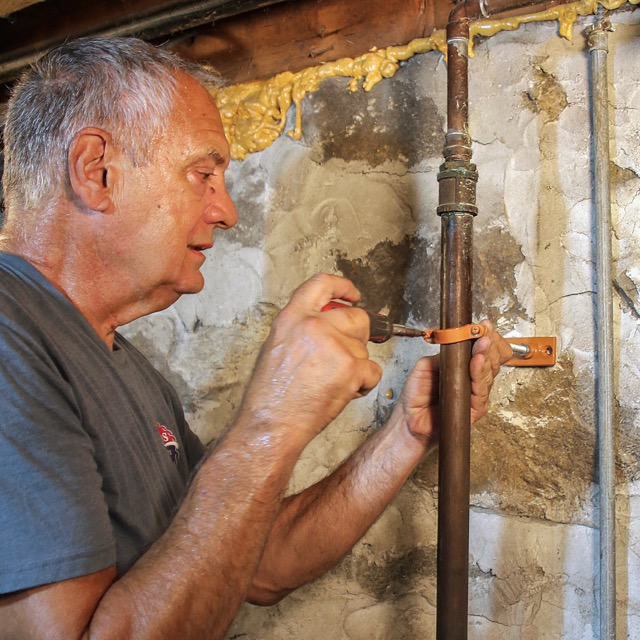 
   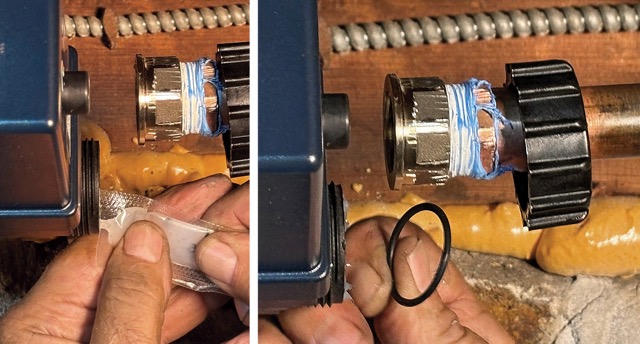 
|
Is a Water-Leak Detector Necessary?
Of the first handful of building professionals I reached out to for this article, few said they were using water-leak detectors regularly. And of those who had installed them, most said that detectors make sense in certain situations, such as an accessory apartment with a water heater under the kitchen sink or a vacation home that is often unoccupied for long periods of time. To builder Travis Brungardt, water-leak detectors seem “mostly unnecessary,” although his company has installed them.
“Only in the case of air handlers above finished spaces have we ever installed them, and I will say I believe that they are justified in those applications,” he wrote in an email. “It’s common in our market for all the mechanicals to be located in unfinished basements with floor drains, so risk is relatively low. I’ve always claimed that washing machines and dishwashers that develop leaks will typically dump water toward the occupant early enough in their cycle to notify them of the issue, and that the failure of a sensor may have as similar a likelihood as a leaky appliance.”
With a bit more probing, I found some professionals who are sold on the value of water-leak detectors, including John Marley, VP of field operations at Spire Builders in Paoli, Pa. For Marley, the reasons to install a robust water-monitoring system are as much about the diagnostic possibilities as they are about the leak-detection capabilities. In an email, Marley described how Moen’s Flo system was helpful on a project that had a meter pit with a newly installed pressure-reducing valve.
“We started to get high-pressure notifications in the middle of the night and then diagnosed that the pressure-reducing valve was failing,” he wrote. “We would’ve had no idea, since the pressure during the day dropped down because of the usage of public water. We also had a client say they had hot water in the house on the cold side; I was able to pull up the app and see a bar graph of the water temp, and it was peaking at 88°F during the summer, coming into the house from the street!”
Danbury, Conn., plumber and Fine Homebuilding contributor Mike Lombardi has been installing leak detectors for a long time, at least on the many water heaters he’s installed in condominiums. The Flood Stop sensor and automatic shutoff has been his go-to product. And now that he’s installed the Flo system on a few single-family homes and the Phyn system on one, he would like to see these whole-house leak detectors become standard plumbing equipment.
“It’s cost-effective. It’s about a one-hour install. The technology has made it so easy,” he says. “I recently installed one for a client, and then he went to Florida for the winter and had someone coming in to water his plants. He was able to leave his house for all that time and leave the water on. The cost of the product and my installation was less than it would have cost to have someone check the house every few days.”
Lombardi also says that a homeowners insurance policy may offer a discount if you install a water-leak detector. So this opportunity for “cheap insurance” may help you save money on your much more expensive actual insurance.
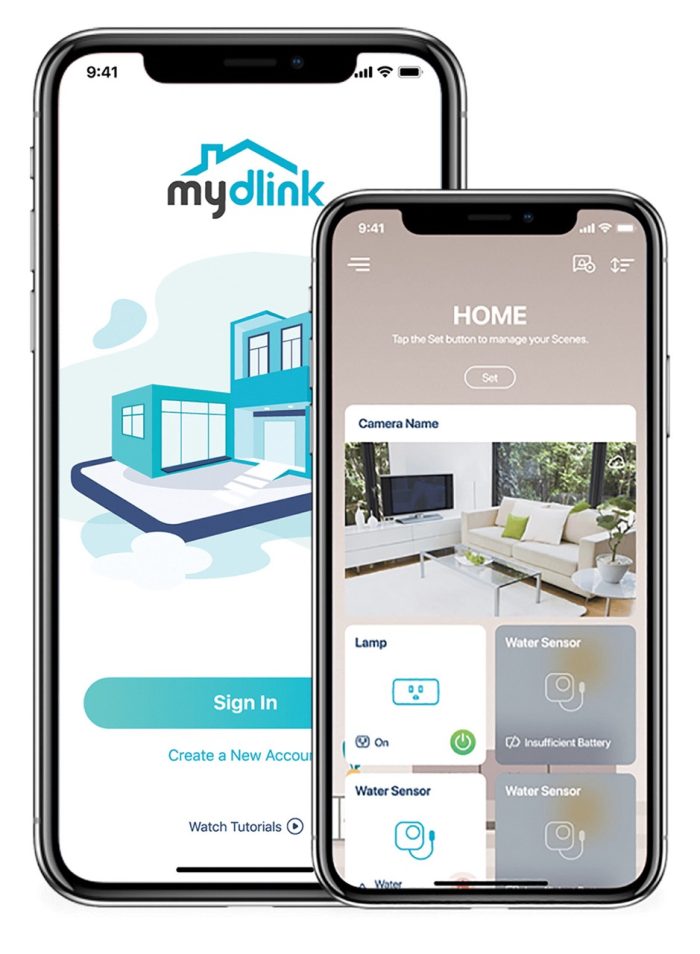
That’s something to consider.
D-Link Water Leak Sensor and Alarm
D-Link is a smart-home technology company that sells Wi-Fi extenders, smart-outlet adaptors, home cameras, and water-leak detectors. Its water-leak detectors are essentially connected alarms. They don’t include valves that turn off the water supply in an emergency, but in places where you have located a sensor, they let you know if water is leaking.
When a leak is detected, an alarm sounds, and notifications are sent to you via the company’s app. D-Link offers battery-powered sensors and sensors that plug into an outlet. For about $90 on Amazon, you can get a starter kit with two additional sensors.
Phyn Plus Shutoff
Phyn offers battery-powered smart water-leak sensors that can be placed anywhere a leak may occur. They have an onboard alarm and send notifications to an app on your phone. They also offer an in-line water monitor and automatic shutoff valve, the Phyn Plus, which is similar in features to the more well-known Moen Flo.
 |
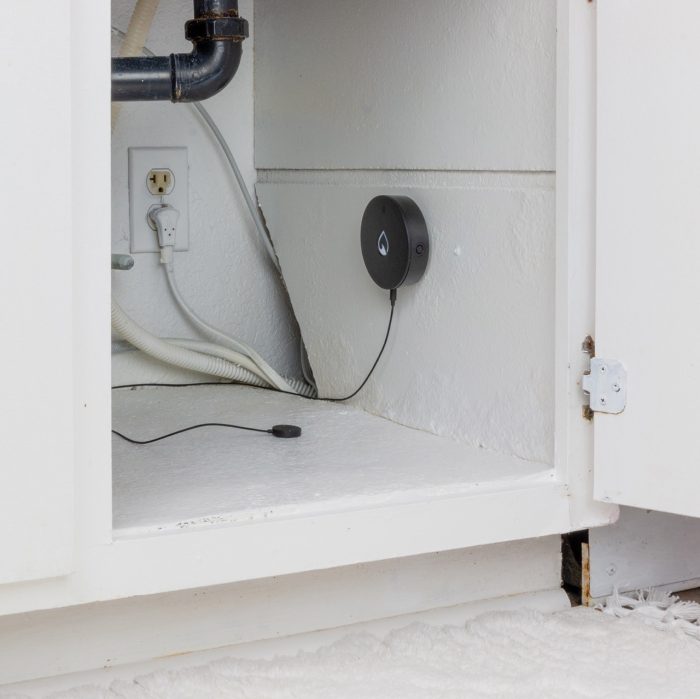 |
Installation is a legitimate plumbing project, and a power supply is needed within about 12 ft. of the valve. Phyn promises very precise monitoring via a water-pressure sensor and water-usage insights via an app. Phyn’s products look like something Apple engineers would design—and, unfortunately, they have a price tag to match. The sensors are $50; the Plus is listed at $575 on Phyn’s website.
Flume Smart Home Water Monitor
Flume is as much a water-usage monitor as it is a leak detector—and in terms of how it works, it may be the most novel. Strapped to your water meter, the Flume monitors the magnetic field to track water usage and uses learning technology and an algorithm to detect leaks.
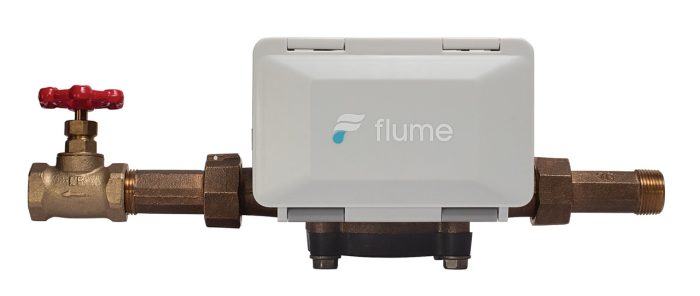
As you might expect, it is connected to an app that is programmed to help you monitor and conserve water. The Flume costs $250 on the company’s website, but we found one on Amazon for $210. For this price, it would be nice if it included an automatic shutoff valve for emergencies, but that would blow the pitch about how easy it is to install.
Resideo Automatic Valve
Resideo’s L5 water-leak detector has an in-line automatic shutoff like the Flo and Phyn products. Unlike those products, which monitor the water in the plumbing system to detect leaks and give usage insights, the Resideo valve is wired to sensors that discover leaks by finding water on the floor, or inside a cabinet, or wherever they are placed.
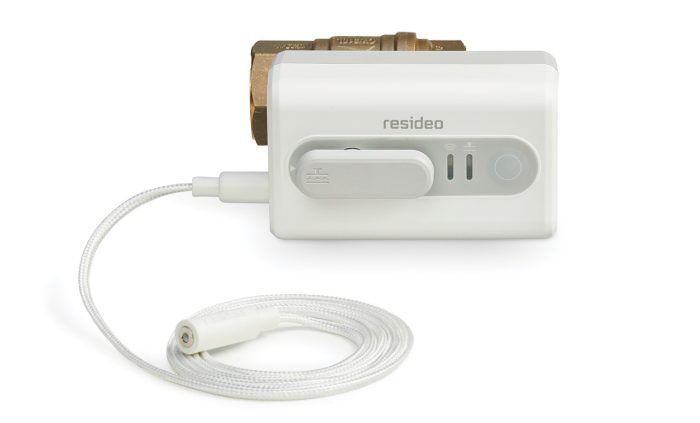
However, the valve can be paired with remote sensors. If an alarm-style sensor that can be connected to your phone is all you are looking for, the Resideo L1 is available on Amazon for around $65. If you’re interested in an automatic shutoff valve, you’ll have to find a plumber who is a “Resideo Pro” to get a price.
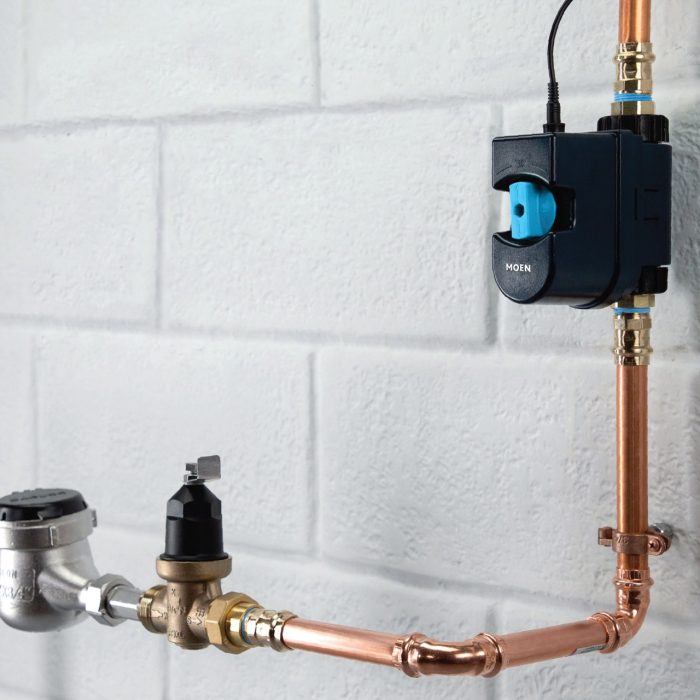
Moen Flo Smart Water Monitor and Shutoff
Moen offers simple plug-in, alarm-style water-leak detectors that can connect to an app on your phone in case you are not home when a leak is detected, but the Flo is one of the more advanced products available. The in-line unit is a smart water monitor, leak detector, and automatic shutoff valve.
The learning technology it uses is called Flosense. In the box, you get most of what you need to install the system, but it is a plumbing project that requires copper or PEX connections, and you’ll need an outlet to plug in the system’s brain, a small box that comes with a simple mounting kit. Prices vary, but expect to spend at least $400.
— Brian Pontolilo; senior editor. Photos by the author, except where noted.
RELATED STORIES


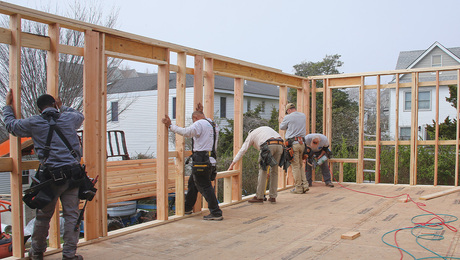

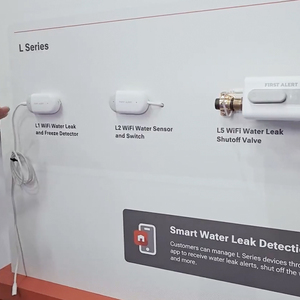
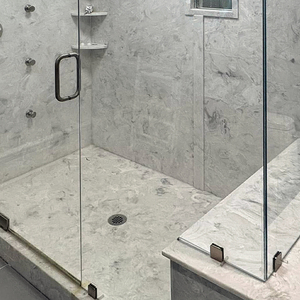
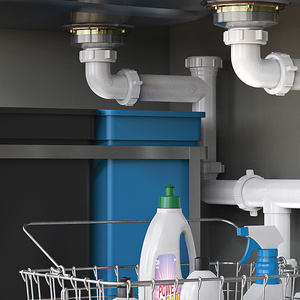




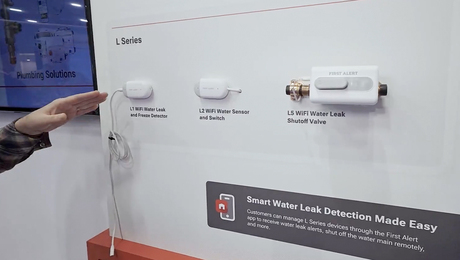


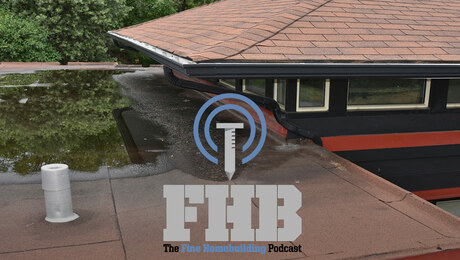
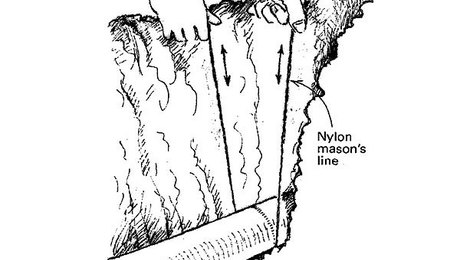











View Comments
Thoughts on the Stream Lab Control? It too monitors flow and can shut the water off. The Flo scares me because it works off of a plastic impeller. That plastic is going to fail sooner or later.
After 6 years in service, the Phy Plus system has done a great job of monitoring my water system. Once the unit has gone through the learning process, you get few false notifications. Now, when I get a notification, I check my faucets, hose bids or toilets. It is usually correct, and I can correct it immediately. Luckily nothing more serious.
It provides peace of mind when you travel between two homes. I used to turn off my water main, but then had to also turn off my icemakers and a water softener. I still have the flexibility to turn off the water from anywhere or confirm that it is shutoff if I feel there is a problem.
I am on a well system and have installed the Phy downstream of the water conditioning equipment. For a "belts and suspenders" approach, I put a leak detector on the floor of the water equipment room. It stops the well pump in the event of a detected leak in the room.
One suggestion on the installation of a water shutoff system - put in a bypass. I didn't find any mention of this in the article. Down the road, when, not if, you have a problem with the automatic valve, you will glad that you did.
Finally, the system provides usage data that will be appreciated by the nerdier of us. Total usage, but also by source use is handy. I was shocked that even with only two people in the house, toilets are the major user. Dishwasher, icemakers and washing machines hardly register.